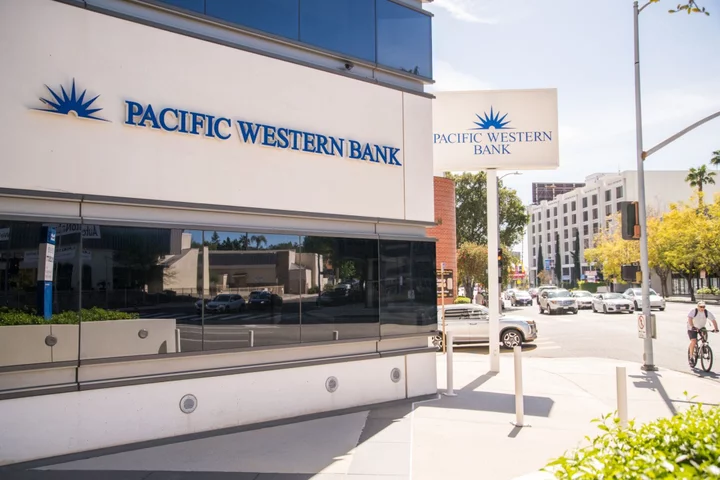Even before a series of failures rattled regional banks across the US this year, one knew it needed to enact sweeping changes.
PacWest Bancorp had spent years on a deal spree — splurging on everything from small community banks to a business catering to homeowners associations, to one of the biggest lenders to the security-systems industry, and more.
For a while, the strategy worked: Profit soared and shares of Beverly Hills-based PacWest regularly yielded more than 5% annually.
Then 2022 arrived.
The Federal Reserve began to raise interest rates aggressively to rein in surging inflation, and PacWest’s deposits fell for the first time in more than a decade. Its executives quickly realized that the firm they had spent years stitching together wasn’t built for this environment. Something had to change.
So late last year, the bank overhauled its senior management ranks. Just weeks later, those same executives unveiled a plan that would allow them to jettison entire businesses, refocus on community banking and shore up its capital cushion. The company — already worried about further “rate bombs” from the Fed — also offloaded a $1 billion portfolio of bonds at a loss to pay off higher-interest borrowings.
PacWest vowed to rein in expenses and set new expectations for loan officers.
“We’re requiring that you’ve got to have a deposit in order to get a loan,” Chief Executive Officer Paul Taylor said in January during the bank’s fourth-quarter earnings call, just weeks after taking the helm. “We’re putting it in their incentives.”
But within weeks, a run on deposits at Silvergate Capital Corp. sparked a chain reaction that toppled Silicon Valley Bank, Signature Bank and, eventually, First Republic Bank. Spooked investors cut exposure to the beleaguered sector and depositors began sniffing for signs of weakness at other lenders.
They followed the scent to PacWest, which had built out a venture-banking business that resembled SVB’s. Customers yanked billions of dollars as the firm scrambled to stabilize capital and liquidity levels, and the stock has plunged 70% this year.
A representative for PacWest didn’t reply to messages seeking comment.
Deal Spree
The firm, which has executive offices in Denver, traces its roots to First Community Bancorp, a small regional lender assembled by John Eggemeyer in 2000 with just $318 million of assets. Almost immediately, Eggemeyer named Matt Wagner the CEO.
The two spent the ensuing two decades gobbling up tiny lenders up and down the West Coast. It wasn’t until 2008, during the throes of the financial crisis, that First Community changed its name to PacWest. Eggemeyer and Wagner leaned in, swallowing three competitors that were felled by the turmoil, and by 2013 they had increased assets 20-fold.
They weren’t done.
The following year, PacWest acquired CapitalSource Inc. for more than $2 billion, its largest deal yet, boosting assets to $15.4 billion. In 2015, the firm was ready to enter even more markets. It bought Square 1 Financial Inc., which catered almost exclusively to venture capital and private equity customers.
Flash forward to 2020, and it was the Square 1 deal that was helping PacWest rake in new business. Deposits surged 30% that year, aided by an increase in activity from VC clients as well as pandemic-related stimulus programs. The following year, deposits rose an additional 45%.
It was the era of cheap money: Investors, hungry for yield, poured money into VC and private equity funds, which in turn invested hundreds of billions in fledgling technology companies. PacWest built out a startup business, too.
All the while, PacWest was generating hefty returns for shareholders. At the end of 2019, its dividend yield was the highest among the 74 banks in the KBW Bank Index and KBW Regional Banking Index.
But investors started souring on PacWest last year as venture deposits plummeted. The company increasingly turned to brokered deposits, a costlier form of funding, alongside borrowings from the Federal Home Loan Bank system. Interest expense soared more than sevenfold to $241 million for the year, crimping profit, regulatory filings show.
Cue the attempted pivot. The bank hired Taylor as president on July 1, intending for him to succeed Wagner on Jan. 1. He ultimately took the reins in November. In a sense, PacWest’s plans meant it would come full circle, refocusing on the base of community deposits that had allowed it to grow for much of the past two decades.
But the recent string of bank failures came before it could engineer the full transition. Since then, PacWest has shed several businesses and loan portfolios.
Just this week, it sold a pool of commercial loans at a discount as well as Civic Financial Services, a lender known for so-called residential business-purpose loans, or mortgages explicitly made for a borrower’s investment property. The company has also explored the sale of its lender finance arm.
The deals announced in recent days helped investor sentiment and the stock rebounded 19% this week. Still, there’s a long way to go, and PacWest’s gilded era may be gone for good.
“You’re making decisions today that the market is liking, but there are consequences over the medium term,” said Keefe, Bruyette & Woods analyst Chris McGratty. “This is not going to be the earner that it was.”
--With assistance from Eliyahu Kamisher and Tom Contiliano.

